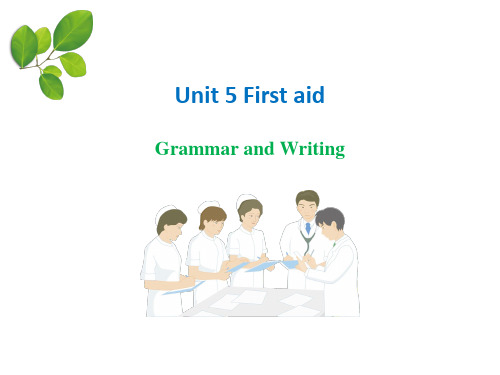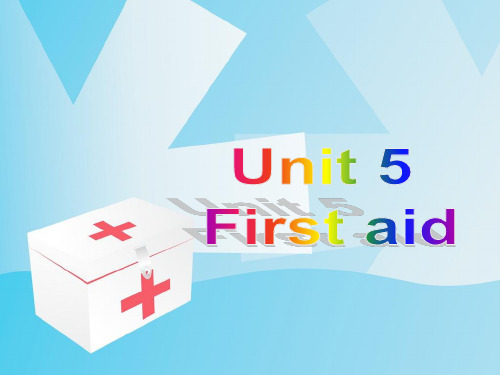2019年高中英语Unit5FirstaidSectionⅢGrammar_省略教案(含解析)新人教版
- 格式:docx
- 大小:131.35 KB
- 文档页数:10

Unit 5 First Aid 教案Grammar EllipsisI. Teaching objectiveGrasp the grammar :Ellipsis (the types ,the ways)II. Teaching focusMaster the rules of ellipsisIII. Teaching difficultiesHow to make the students master the uses and the rules of the grammar.IV. Teaching procedures在英语中,为了避免重复而省去某些重复的部分,这种现象叫省略。
如:--- (I )Beg you pardon.2) Sounds like a good idea.--- ( It ) Sounds like a good idea..一简单句中的省略1、省略主语祈使句中主语通常省略( It ) doesn’t matter.( It ) Sounds like a good idea.2、省略主谓或主谓语的一部分。
如:(省略主语和谓语)3、省略表语。
–Are you thirsty? – Yes, I am .(thirsty).4、同时省略几个成分) Let’s meet at the same place as--- (we met) yesterday.同时省略主、谓语–Have you finished your work ? –Not yet.-----I have not finished my homework yet.二并列句中的省略1、两个并列句中,后一个分句常省略与前一分句中相同的部分。
My brother is a doctor and my sister-in-law (is) a lawyer.省略相同的谓语动词)When summer comes, the day is getting longer and longer, and the night (is getting) shorter and shorter. 省略相同的谓语动词三复合句中的省略1、主句中有一些成分被省略,如:(I am) Sorry to hear you are ill.( It’s a ) Pity that he missed such a good chance.2 主句中有一些成分被省略、而用so或not来代替1) -Are you leaving for Beijing this Sunday?-I think so .(I'm leaving for Beijing this Sunday.)2) -Tom must be free today.-If so, he can help us .(he is free.)3) -It is going to rain, isn’t it?-I hope not. (it is not going to rain.)这种用法常见的有:How so? Why so? Is that so? I hope so. He said so.及I suppose/believe/hope not. Why not?等等。




Grammar and Writing 目标导航Grammar——复习动词-ing形式用括号内词的适当形式填写下面教材中的句子并体会它们的语法特征。
1.As you can imagine, getting (get) burnt can lead to very serious injuries.2.The first and most important step in the treatment of burns is giving (give) first aid. 3.Burns are divided into three types, depending (depend) on the depth of skin damage. 4.Place burns under cool running (run) water, especially within the first ten minutes.5.Remove any clothes using (use) scissors if necessary, unless you see the fabric sticking (stick) to the burnt skin. 6.Applying (apply) oil to the injured areas is a bad idea, as it will keep the heat in the wounds and may cause infection.【自主发现】动词-ing形式是非谓语动词的一种,起名词的作用,同时保留动词的属性,可在句中充当主语、宾语、表语、定语、宾语补足语和状语。
语法解析一、动词-ing形式的时态和语态[名师提醒](1)动词-ing形式的否定式是在前面加not构成。
Not having been invited to the party, she was very upset.没有被邀请参加聚会,她很不高兴。
![新人教必修五 Unit 5 First aidGrammar[语法]PPT课件](https://img.taocdn.com/s1/m/d97bdaa0c8d376eeaeaa31ae.png)
Unit5 GrammarTeaching materials: 教学材料Learning about language and using words and expressions. on workbook p70-71 Teaching goals1.Target languagea. Key words and expressions:aid, first aid, illness, injury, poisonous, burn, swollen, damage, treatment, wounded, infect, organ, cause, characteristics, electric. Fall ill.eful sentences1)Burns are called first degree burns, second degree burns or third degree burns.2)These burns affect both the top layer of the skin and they affect the second layer ofthe skin.2.Ability goalsLearn about Ellipsis3.Learning ability goalsLet Ss learn how to use Ellipsis4. Teaching important pointsThe use of Ellipsis5. Teaching difficult pointsHow to teach Ss to master EllipsisTeaching aidsA projector, and a blackboardTeaching procedures and waysStep 1 Revision1.Greet the whole class as usual2.The teacher checks the students’ homework.Step 2 Word StudyT: Now please open your books and turn to Page 36. Let’s learn “Learning about Language”.First let’s d o Discovering useful words and expressionsplete the table with the correct verbs, nouns or adjectives.T: Let’s do some more exercises about new words. You are to explain the words on the screenin English and then fill in the blanks.(ask students to explain or guess the meanings of the words)plete the questions with words from the text.The students will try to complete the exercises. Later the teacher will ask some of them to read each of the sentences and tell the class the answers.Suggested answers:Step 3: GrammarT: Let’s look at the next, Grammar (page 91)Present some sentences and encourage the students to find out which words have been left out.T: Observe the following sentences and discuss with your partner to find out what have been left out. Let me show you an example. As we know, when people want the speaker to repeat what he said, they usually say “ Beg your pardon.”Then it is called Ellipsis. The subject “I” has been left out, without changing the meaning of th e sentence .OK, now it’s your turn to find out what have been left out.1.Haven’t seen you for ages.2.Some more tea?3.Sounds like a good idea.4.Doesn’t matter.5.Sorry to hear that.6.Pity you couldn’t come7.This way, please.8.Terrible weather!9.Joining us for a drink?10.Going to the supermarket?Suggested answers:1.I haven’t seen you for ages.2.Would you like some more tea?3.That/It sounds like a good idea.4.It doesn’t matter.5.I’m sorry to hear that.6.It’s/ What pity you couldn’t come7.Step this way, please.8.What terrible weather it is!9.Are you joining us for a drink?10.Are you going to the supermarket?Step 5 Homework1. Go over the usage of Ellipsis.2. Finish listing structures on Page 71 Ex 1 and Ex 23. Prepare Reading and discussing on Page 38。
Section Ⅲ Grammar—省略语法图解探究发现1.(You) Come in, please!2.John is a lawyer, and his wife (is) a cleaner.3. a.First degree burns turn white when (they are)pressed.b.If burns are on arms or legs, keep them higher than the heart, if (it is) possible.4. a.He is the man(who/whom/that) you can depend on.b.There is no doubt that John’s quick thinking and the first aid skills (that/which) he learned at school saved Ms Slade’s life.5.The boy wanted to play football in the street, but his mother did not allow him to (play football in the street).6. It shows (that) a knowledge of first aid can make a real difference.[我的发现](1)例句1为简单句中的省略。
(2)例句2为并列句中的省略。
(3)第1组例句为状语从句的省略。
当状语从句的主语和主句的主语指的是同一人或物,且由人称代词的主格担当,或当状语从句的主语为it,而且从句谓语中含有be动词时,可以把从句的主语和be动词一起省略。
(4)第2组例句为关系代词的省略。
当关系代词在限制性定语从句中作宾语时可以省略。
(5)例句5为不定式的省略。
有时可用不定式符号“to”来替代上文中出现的不定式。
(6)例句6体现的是当及物动词之后跟由连接词that引导的宾语从句时,that可以省略。
为了避免重复,或为了使句子更简练,在一些句子中常常省去一个或某几个成分,这种语法现象在英语中叫省略。
在英语句子中,常见的省略情况有以下几种:一、简单句中的省略1.省略主语:一般情况下,主语是不能省略的,但在祈使句和其他不容易引起歧义的情况下,特别是在口语中,主语常常省略,主要是祈使句中的you和疑问句中的主语。
(You) Shut up!住嘴!(You) Want a hand?需要帮忙吗?(I) Beg your pardon.请再说一遍。
(It) Doesn’t matter.没关系。
2.省略宾语:当上、下或前后两个句子的宾语一致时,下句或后句常省略宾语。
—Do you know Miss Gao?—I don’t know (her).——你认识高女士吗?——不认识。
3.省略主语和谓语(或谓语的一部分):在某些具体的场合下,主语和谓语都很明确,此时为了简化或显得亲切等,可将主语和谓语(或谓语的一部分)同时省略,只剩下表语、宾语、状语或其他成分。
(You come) This way, please.请这边走。
(省略了主语和谓语)(Have you) Got any ink?你有墨水吗?(省略了主语和谓语的一部分)[即时演练1] 补全下列省略句①Have a seat, please!You_have_a_seat,_please!②Looks like rain.It_looks_like_rain.③Let’s do the dishes. I’ll wash and you dry.Let’s_do_the_dishes._I’ll_wash_and_you_dry_them/the_dishes.④Got any idea about the plan?Have_you_got_any_idea_about_the_plan?二、并列句中的省略在由and或but连接的并列句中,常省略一些重复的词或词组。
1.省略共同的主语或宾语。
Tom picked up a book on the floor and (Tom) handed it to his teacher.汤姆在地板上捡起了一本书并把它交给了老师。
2.若主语不同,而谓语部分的系动词、助动词或情态动词相同,则省略后面的系动词、助动词或情态动词。
Jack must have been playing football and Mary (must have been) doing her homework.杰克肯定一直在踢足球,玛丽肯定一直在做家庭作业。
3.若主语与谓语动词相同,则省略后面的主谓成分。
His advice made me happy, but (his advice made) Jim angry.他的建议使我高兴,却使吉姆生气。
4.若主语不同,但主要动词及后续部分相同,则省略主要动词及后续部分。
He has a knowledge of first aid but his friend doesn’t (have a knowledge of first aid).他具备急救知识,但他朋友不具备。
[即时演练2] 写出下列句中可以省略的部分①Some of us study Japanese, and others study English.others后的study②He gave up drinking several months, but he returned to his old way later.he③My friend didn’t come to school, but I wonder why he/she didn’t come to school.he/she_didn’t_come_to_school三、复合句中的省略1.状语从句的省略(1)在when, while, if, as if, though, although, as, until, once, whether, unless, whenever等连接的状语从句中,当从句主语跟主句的主语相同且从句谓语中含有系动词be 或从句的主语为it时,则从句中主语和be动词常被省略。
Wood gives off much smoke while (it is)burning.木头燃烧时产生很多烟。
Whenever(it is)possible, they would stop him and ask him the three questions.只要有可能,他们就让他停下并问他这三个问题。
Will you be free this Sunday? If (it is)so, let’s go camping.这个周日你有空吗?如果有,我们去野营吧。
[名师点津] 省略句中的谓语动词和主语之间构成主动关系,则使用现在分词;若构成被动关系,则使用过去分词;若谓语动词表示的动作尚未发生,则使用不定式。
When (it is)heated, ice can be turned into water.加热的时候冰可以变成水。
(2)在than, as等引导的比较状语从句中常省略某些成分。
They don’t use more water than (it is)necessary.他们使用的水没有超出需要量。
He runs as fast as Bob(runs).他和鲍勃跑得一样快。
[名师点津] 并非所有的状语从句都可以省略主语和be动词,由after, before, because等词引导的状语从句一般要改写成介词短语等,用动名词代替be动词。
Because he was ill, he didn’t attend the meeting.→Because of being ill, he didn’t attend the meeting.(正)→Being ill, he didn’t attend the meeting.(正)→Because ill, he didn’t attend the meeting.(误)由于生病了,他没有出席会议。
[即时演练3](1)用所给词的适当形式填空①When surfing (surf) the Internet, I downloaded the film.②(2015·湖南高考改编)Video games can be a poor influence if left (leave) in the wrong hands.③He shook his head as if to_say (say) “no”.(2)把下列句子改为省略句①If it is so, I hope you will have a wonderful time.→If_so,_I hope you will have a wonderful time.②The winters in Hangzhou are not so mild as they are in Guangzhou.→The winters in Hangzhou are not so mild as_in_Guangzhou.2.定语从句的省略(1)在限制性定语从句中,作宾语用的关系代词whom, which, that可省略(但whom, which紧跟在介词后时不能省略)。
The exact year(which/that)Angela and her family spent together in China was 2008.安哥拉和她的家人一起在中国度过的那一年是2008年。
(2)修饰way的关系词that/in which可以省略。
The way ⎩⎪⎨⎪⎧⎭⎪⎬⎪⎫in which that /he speaks to us is really annoying.他对我们讲话的方式真是让人讨厌。
[即时演练4] 写出下列句中可以省略的部分①(2014·江西高考改编)Among the many dangers which sailors have to face, probably the greatest of all is fog.which②(2014·陕西高考改编)Please send us all the information that you have about the candidate for the position.that3.宾语从句的省略(1)及物动词后接宾语从句时,连接词that 一般可以省略;但如果及物动词接两个或两个以上that 引导的宾语从句,那么只有第一个that 可以省略。